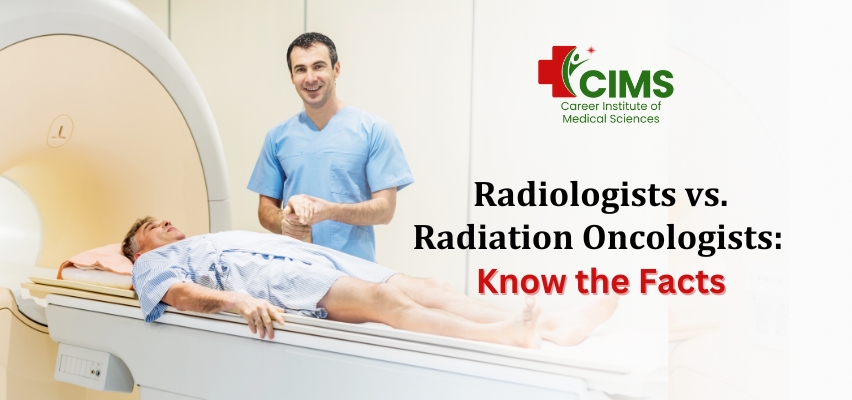Table of Contents
ToggleRadiologists vs. Radiation Oncologists: Know the Facts
Know the difference between radiologists vs radiation oncologists. Learn about their roles, training, and impact on cancer treatment and diagnosis.
Radiation oncologists and radiologists play important roles in medical care, each focusing on different aspects of disease diagnosis and treatment. This blog highlights the role of radiation oncologists and explains how they differ from radiologists. We also mention the Career Institute of Medical Science (CIMS) as one of the best hospitals in Bhopal, providing exceptional medical care to patients.
Quick Fact Table
Aspect | Radiation Oncologist | Radiologist |
|---|---|---|
Primary Focus | Specializes in cancer treatment with radiation therapy. | Focuses on diagnosing diseases with medical imaging. |
Role | Develops and manages radiation therapy to treat cancer. | Analyzes medical images to diagnose conditions. |
Education | Medical school + residency in radiation oncology. | Medical school + residency in radiology. |
Training | Oncology, radiation physics, and radiation therapies. | Imaging techniques and image interpretation. |
Scope of Work | Collaborates with surgeons and medical oncologists to develop comprehensive cancer treatment strategies. | Works in diagnostic imaging centers or hospitals, providing diagnostic reports to guide treatment decisions. |
Key Responsibilities | Patient evaluation, Treatment Planning, Monitoring, and adjustments. | Image interpretation, Reporting Interventional procedures. |
Patient Interaction | Directly involved in patient treatment and ongoing care. | Primarily involved in diagnostic processes with limited direct patient interaction. |
Collaboration | Works with radiologists and other specialists to plan and monitor treatment. | Provides diagnostic images and reports used by radiation oncologists to plan treatments. |
What is a Radiation Oncologist?
Definition and Role
A radiation oncologist is a medical doctor specializing in cancer treatment using radiation therapy. They create and manage therapies, ensuring that radiation properly targets cancer cells while preventing harm to healthy tissue.
Education and Training
Radiation oncologists graduate from medical school and then finish residency training in radiation oncology. Their education involves knowledge of cancer biology, radiation physics, and radiation therapies used for treatment.
Scope of Work
They collaborate on a multidisciplinary team, including surgeons and medical oncologists, to develop comprehensive cancer treatment strategies.
Key Responsibilities of a Radiation Oncologist
Patient Evaluation
Radiation oncologists examine patients to decide if radiation therapy is suitable, considering the type, stage of cancer, and patient health.
Treatment Planning
They design detailed plans using advanced imaging to target cancer cells accurately, calculating doses and configuring equipment.
Monitoring and Adjustments
They monitor patient progress, adjusting treatment plans to ensure effectiveness and manage side effects.
What is a Radiologist?
Definition and Role
A radiologist is a medical doctor specializing in diagnosing diseases using medical imaging like X-rays, CT scans, MRIs, and ultrasounds.
Education and Training
Radiologists complete medical school followed by a residency in radiology, focusing on mastering imaging techniques and interpreting images to diagnose conditions.
Scope of Work
Radiologists work in diagnostic imaging centers or hospitals, providing detailed reports to guide treatment decisions by other physicians.
Key Responsibilities of a Radiologist
Image Interpretation
Radiologists analyze medical images to diagnose conditions ranging from fractures to complex diseases like cancer.
Reporting
They provide detailed diagnostic reports based on image analysis, crucial for treatment planning by other doctors.
Interventional Procedures
Some radiologists perform interventional procedures, like biopsies or minimally invasive treatments, combining diagnostic and therapeutic roles.
Radiologists vs Radiation Oncologists
Primary Focus
- Radiation Oncologist: Specializes in cancer treatment with radiation therapy.
- Radiologist: Focuses on diagnosing diseases with medical imaging.
Treatment vs. Diagnosis
- Radiation Oncologist: Develops and administers radiation treatment plans.
- Radiologist: Interprets medical images to diagnose conditions.
Training and Expertise
- Radiation Oncologist: Extensive training in oncology and radiation therapy.
- Radiologist: Specialized training in medical imaging and image interpretation.
Patient Interaction
- Radiation Oncologist: Directly involved in patient treatment and ongoing care.
- Radiologist: Primarily involved in diagnostic processes with limited direct patient interaction.
Collaboration Between Radiation Oncologists and Radiologists
Integrated Care
Both specialists often collaborate to ensure comprehensive patient care. Radiologists provide diagnostic images that radiation oncologists use to plan and monitor treatment.
Multidisciplinary Teams
In cancer care, radiation oncologists and radiologists work within multidisciplinary teams to develop and execute effective treatment strategies.
About Career Institute of Medical Sciences (CIMS)
Career Hospital Bhopal, located in Madhya Pradesh, is the best cancer hospital in Bhopal, known for providing high-quality healthcare services to the residents of Bhopal and its surrounding areas. The hospital offers comprehensive care and is particularly recognized for its specialized oncology wing, featuring top Cancer Doctors and supporting staff. With over 150 beds, including various room types, as well as ICU and NICU facilities, the hospital ensures that patients receive the care they need. For more information, visit Career Hospital Bhopal in person or on our official website at Career Hospital Bhopal.
Conclusion
Understanding the distinct roles of radiation oncologists and radiologists is essential for appreciating their contributions to healthcare. While radiation oncologists specialize in cancer treatment with radiation therapy, radiologists excel in diagnosing diseases through medical imaging. Both are crucial in patient care, often collaborating to ensure accurate diagnoses and effective treatments, enhancing patient outcomes in modern medicine.
FAQs
Q1. What types of cancers do radiation oncologists treat?
Answer: They treat various cancers, including breast, prostate, lung, and head and neck cancers, using tailored radiation therapy approaches.
Q2. Can radiologists treat patients directly?
Answer: Radiologists primarily focus on diagnosis, but interventional radiologists perform minimally invasive treatments.
Q3. How long does radiation therapy usually last?
Answer: Radiation therapy typically ranges from one to eight weeks, depending on the cancer type and treatment plan.
Q4. What imaging techniques do radiologists use most often?
Answer: Radiologists commonly use X-rays, CT scans, MRIs, and ultrasounds for diagnostic purposes.
Q5. Are radiation oncologists involved in cancer diagnosis?
Answer: While primarily focused on treatment, radiation oncologists work closely with diagnostic teams to understand the cancer before planning therapy.
Q6. How do radiation oncologists minimize the side effects of treatment?
Answer: They use advanced planning and imaging techniques to precisely target tumors, sparing healthy tissues and reducing side effects.




Very informative
Thank you, ma’am.
Very informative and knowledgeable
Thanks for sharing 🙏